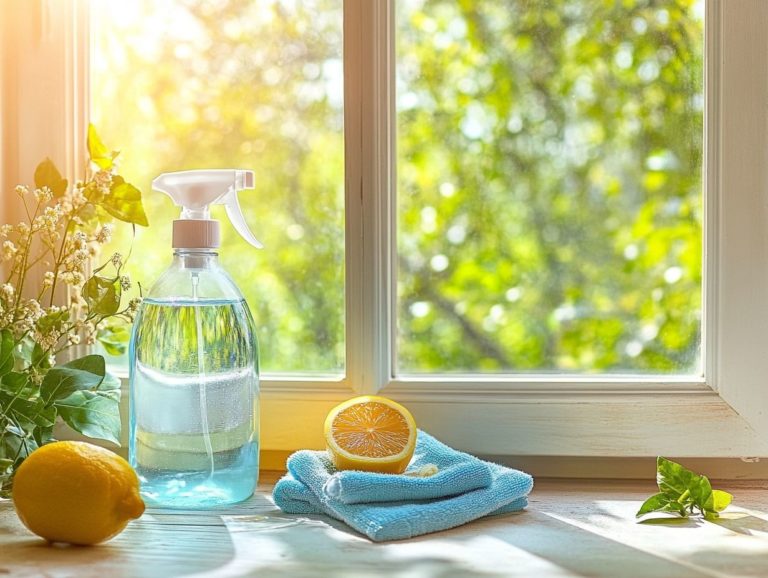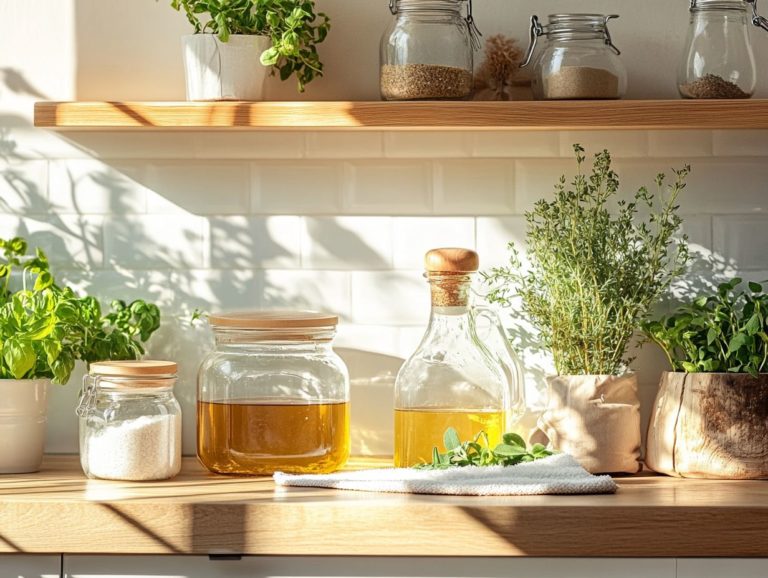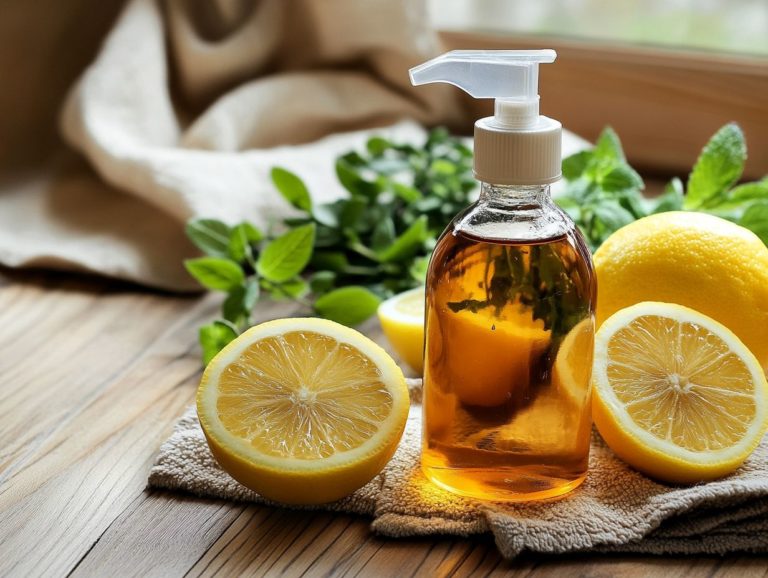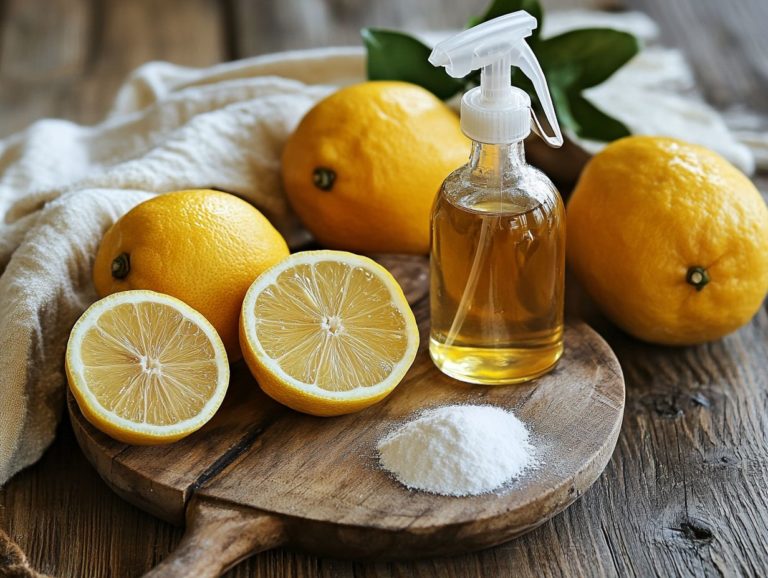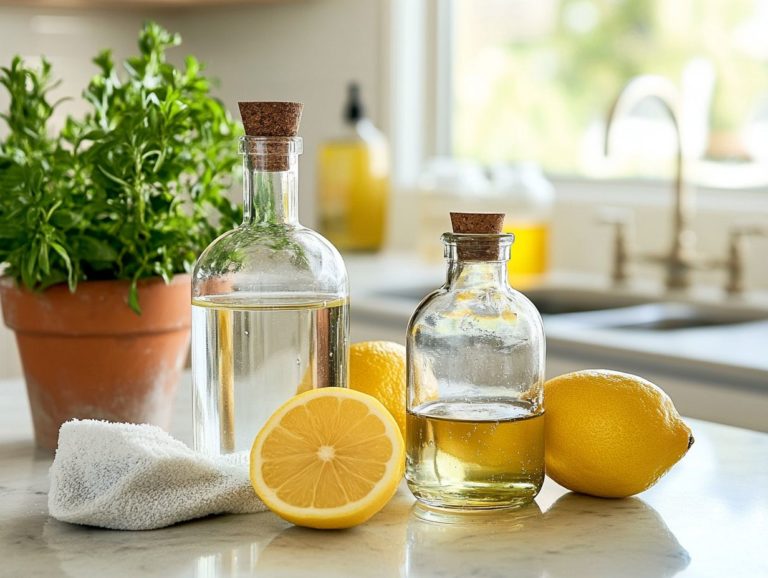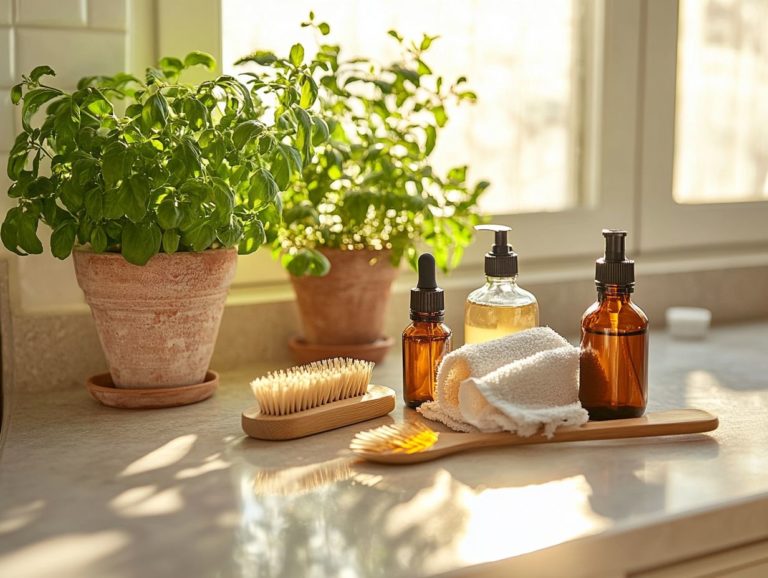5 Reasons to Use Homemade Cleaners
In a world where sustainability and health reign supreme, the trend of crafting your own homemade cleaners is on the rise and for excellent reasons.
These eco-friendly alternatives not only contribute to a safer environment for you and those around you but also offer a more budget-friendly and customizable approach to meet your unique cleaning demands.
Consider five compelling reasons to adopt homemade cleaners, familiarize yourself with the most common ingredients, and uncover tips for ensuring their effectiveness and safe storage.
Embrace this opportunity to transform your cleaning routine, all while championing a healthier lifestyle.
Contents
- Key Takeaways:
- 1. Safer for You and the Environment
- 2. More Affordable
- 3. Customizable for Specific Cleaning Needs
- 4. Reduces Exposure to Harmful Chemicals
- 5. Promotes a More Sustainable Lifestyle
- How Can One Make Their Own Homemade Cleaners?
- What Are the Most Common Ingredients Used in Homemade Cleaners?
- Are Homemade Cleaners Effective in Killing Germs?
- What Are Some Common Household Items That Can Be Used for Cleaning?
- How Can Homemade Cleaners Be Stored and Used Safely?
- What Are the Most Effective Homemade Cleaners for Different Surfaces and Stains?
- Frequently Asked Questions
Key Takeaways:
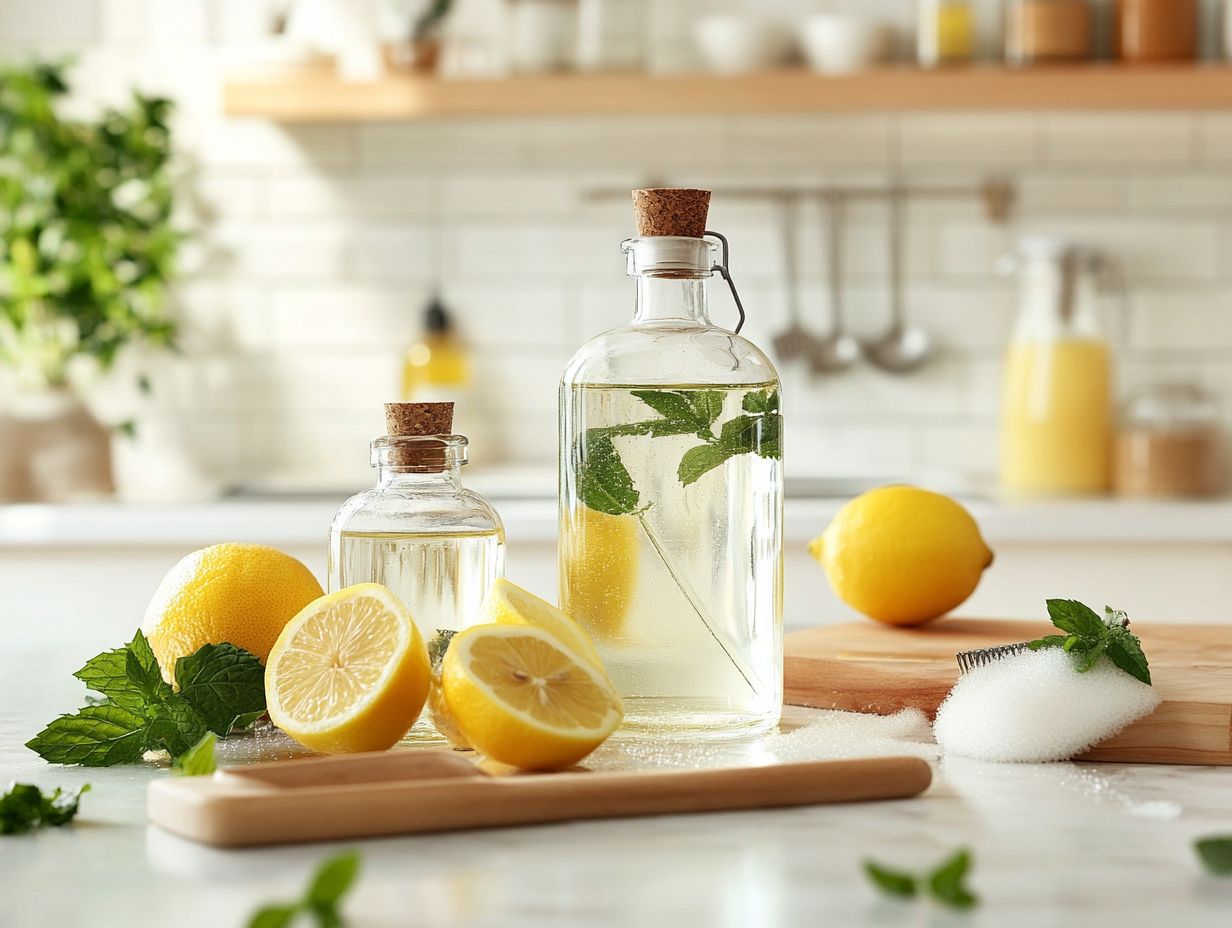
- Homemade cleaners are safer for both you and the environment, reducing exposure to harmful chemicals and promoting a more sustainable lifestyle.
- Making your own cleaners is more affordable than purchasing commercial products, helping you save money in the long run.
- Homemade cleaners can be customized to meet specific cleaning needs, using common household items and ingredients to effectively clean various surfaces and stains.
1. Safer for You and the Environment
Choosing natural cleaning products is a powerful step for prioritizing your health by minimizing exposure to harmful chemicals. It also allows you to contribute positively to the environment, cultivating a safer indoor air quality while reducing your ecological footprint through eco-friendly cleaning practices.
The rise of eco-friendly brands like Seventh Generation and Puracy reflects a growing awareness of the adverse effects associated with traditional cleaning agents, which often harbor toxic substances that can lead to respiratory issues and skin irritations. By opting for alternatives that utilize plant-based ingredients, you re not just safeguarding your well-being; you re actively promoting sustainable practices that reduce pollution and conserve precious natural resources.
These safer options help decrease the synthetic chemicals that find their way into waterways, ensuring that both your personal spaces and the broader ecosystem remain less contaminated. In doing so, you contribute to fostering a cleaner, healthier environment for future generations, reinforcing the vital connection between personal responsibility and environmental stewardship.
2. More Affordable
Eco-friendly cleaning options, particularly those DIY cleaning solutions, often present a more budget-friendly alternative to commercial cleaners, delivering effective results without straining your finances.
By choosing straightforward, cost-effective ingredients like baking soda and vinegar, you can whip up your own cleaning products that rise to the challenge of everyday messes with ease. Unlike many store-bought options that are laden with harsh chemicals and adorned with flashy branding, these natural ingredients not only foster a healthier home environment but also help you significantly reduce household expenses.
For instance, a multipurpose cleaner crafted from vinegar and water can replace several pricey products, perfectly illustrating how sustainability and frugality can coexist beautifully. By embracing these natural solutions, you can keep your living space spotless while being considerate of both your budget and the planet.
3. Customizable for Specific Cleaning Needs
Natural cleaning offers you the luxury of customizable solutions tailored to your specific cleaning needs. With DIY cleaning recipes at your fingertips, you can incorporate effective cleaning agents and allergen-free, plant-based ingredients to achieve optimal results.
By embracing this approach, you can effortlessly craft your own antibacterial cleaning products suited for various surfaces, whether you’re battling stubborn grease in the kitchen or refreshing surfaces in the bathroom. The beauty of personalized cleaning solutions lies in your ability to modify ingredients based on your individual preferences or sensitivities. This ensures that each recipe not only meets your desired level of cleanliness but also aligns with your health and environmental values.
This level of adaptability enables you to take charge of your cleaning routine, creating an effective and safer home environment that caters directly to your unique needs.
4. Reduces Exposure to Harmful Chemicals

Utilizing eco-friendly cleaning products significantly reduces your exposure to toxic ingredients commonly found in conventional household cleaners. This choice offers big health benefits and contributes to improved indoor air quality.
The EPA estimates indoor air can be two to five times more polluted than outdoor air, primarily due to chemicals released by traditional cleaners. Prolonged exposure to these harmful substances can lead to respiratory issues, skin irritations, and other serious health complications, according to the Centers for Disease Control and Prevention (CDC).
By opting for environmentally safe alternatives, you can lower the risk of these health issues. Transitioning to green products not only promotes your well-being but also aligns with public health initiatives aimed at reducing chemical exposures, ultimately benefiting you and the environment.
5. Promotes a More Sustainable Lifestyle
Adopting eco-friendly cleaning habits fosters a sustainable lifestyle. It encourages you to embrace biodegradable packaging and green cleaning products, while supporting brands committed to environmental stewardship.
Choosing products made from plant-based ingredients can significantly reduce your ecological footprint. Many brands prioritize sustainable sourcing and manufacturing processes, ensuring each item cleans effectively and contributes to a healthier planet. For example, brands like Seventh Generation and Method use recyclable materials and eco-conscious ingredients that break down safely in the environment.
As you make informed choices, your collective impact cultivates a culture of sustainability, nudging manufacturers toward greener practices. This change matters greatly! It enhances your health and safety while encouraging a broader commitment to safeguarding natural resources for future generations.
How Can One Make Their Own Homemade Cleaners?
Creating your own homemade cleaners is a straightforward approach to using natural cleaning products without toxic ingredients. This enables you to craft safer alternatives that are both efficient and environmentally friendly.
By leveraging everyday ingredients like vinegar, baking soda, and essential oils, you can tackle various cleaning tasks around your home. These ingredients excel at cutting through grime and significantly reduce chemical exposure for your family and pets.
To get started, gather your supplies and select versatile cleaning solutions tailored to your needs, whether it s an all-purpose cleaner or a dedicated bathroom scrub. When mixing these ingredients, remember to follow safety precautions like wearing gloves and ensuring proper ventilation. This will enhance both your safety and the effectiveness of your natural cleaning efforts.
What Are the Most Common Ingredients Used in Homemade Cleaners?
The most common ingredients for homemade cleaners include natural and plant-based options like vinegar, baking soda, and essential oils. These serve as highly effective solutions for various surfaces.
These ingredients provide a safer alternative to harsh chemicals and offer remarkable versatility. For instance, vinegar s high acidity effectively kills germs, making it perfect for combating soap scum and grime in kitchens and bathrooms. Baking soda is a gentle abrasive, meaning it cleans without scratching surfaces and lifts stains and neutralizes odors, especially when combined with vinegar, which creates a delightful bubbling reaction that amplifies its cleaning power.
Essential oils, like tea tree or lavender, not only infuse your cleaning routine with pleasant scents but also possess antimicrobial properties, making them ideal for homemade disinfectants.
A simple yet effective recipe involves mixing equal parts of vinegar and water, adding a few drops of essential oil, and using this mixture to wipe down countertops or sinks. This leaves you with a clean and fresh environment that feels inviting.
Why not try making your first cleaner this weekend?
Are Homemade Cleaners Effective in Killing Germs?
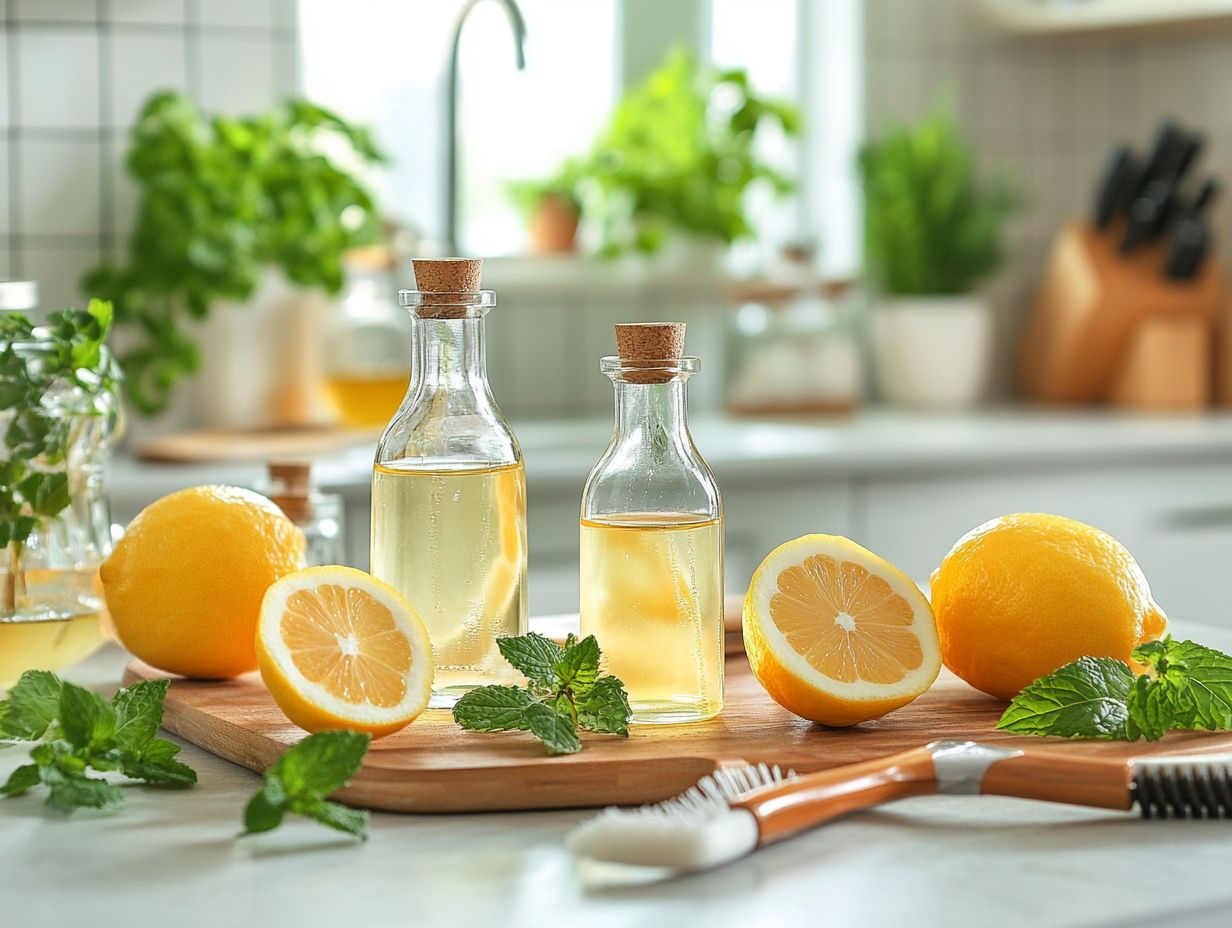
Homemade cleaners can be remarkably effective in eliminating germs, especially when crafted with antibacterial products and natural ingredients celebrated for their disinfecting properties. This approach not only improves your health but also makes your cleaning routine more thoughtful.
By opting for these homemade solutions, you significantly lessen your dependence on harsh commercial chemicals. This fosters a healthier indoor environment and improves indoor air quality. For instance, vinegar, a staple in your kitchen, boasts impressive antimicrobial capabilities, effectively tackling a variety of bacteria and viruses, including E. coli and Salmonella. Moreover, essential oils such as tea tree and eucalyptus have been recognized in numerous studies as strong protectors against germs.
When you combine these ingredients, you amplify their germ-killing abilities, making homemade cleaners a strong and sustainable choice for keeping your home clean. These eco-friendly cleaners support sustainable practices and lower your overall environmental impact.
What Are Some Common Household Items That Can Be Used for Cleaning?
Common household items like baking soda, vinegar, and lemon juice serve as remarkably effective cleaning solutions in your DIY cleaning endeavors, making natural cleaning products both accessible and economical for you. These green cleaning products often use plant-based ingredients and avoid toxic ingredients found in commercial counterparts.
These versatile staples not only lessen your reliance on chemical-laden cleaners but also foster a healthier living environment free from indoor pollution and household allergens. For instance, baking soda acts as a gentle abrasive, perfect for scrubbing surfaces such as countertops and sinks without leaving a scratch. Meanwhile, vinegar s acidity works wonders for breaking down grease and grime on stovetops.
And let s not forget about lemon juice; with its natural antibacterial properties, it excels at cutting through soap scum in bathrooms and freshening up cutting boards. By embracing these safer alternatives, you can save money while minimizing exposure to the harmful substances often found in commercial cleaning products, ensuring you have peace of mind in your home.
How Can Homemade Cleaners Be Stored and Used Safely?
Storing and using your homemade cleaners safely requires a solid understanding of proper containment methods and usage guidelines. This ensures you can reap their health benefits while minimizing any risks associated with chemical exposure.
To achieve this, it s essential to choose sturdy containers, preferably glass or high-quality plastic, that can handle potential leaks and spills. Each container should be prominently labeled with its contents and ingredients, including any necessary safety precautions for use. You should also take into account the environments where these cleaners will be used, particularly in homes with children, pets, or individuals with sensitive skin.
Keeping these cleaners out of reach, using child-proof lids, and always ensuring the area is well-ventilated during application can significantly enhance safety. This keeps your home clean and gives you peace of mind while contributing to sustainable practices.
What Are the Most Effective Homemade Cleaners for Different Surfaces and Stains?
The most effective homemade cleaners can vary depending on the surface and type of stain. Natural cleaning products are designed to tackle specific cleaning challenges throughout your home. Many eco-friendly brands like Puracy, Simple Green, and Seventh Generation offer recipes and products that can be used to create effective cleaning solutions!
Whether it s those streaks on your glass windows, the grime on your wooden furniture, or the pesky marks on your upholstery, each area calls for a tailored approach. For your glass surfaces, a simple blend of vinegar and water can leave them shimmering like new. Meanwhile, wood surfaces thrive on a mixture of olive oil and lemon juice. Not only does it clean, but it conditions the wood beautifully!
For stubborn stains, consider using household cleaners that incorporate antibacterial products. In terms of fabric stains, you can create a paste from baking soda and water, offering a gentle yet effective solution for those stubborn spots. Employing these methods guarantees a spotless home and fosters a healthier living environment, free from harsh chemicals and harmful chemicals that contribute to indoor pollution.
Frequently Asked Questions
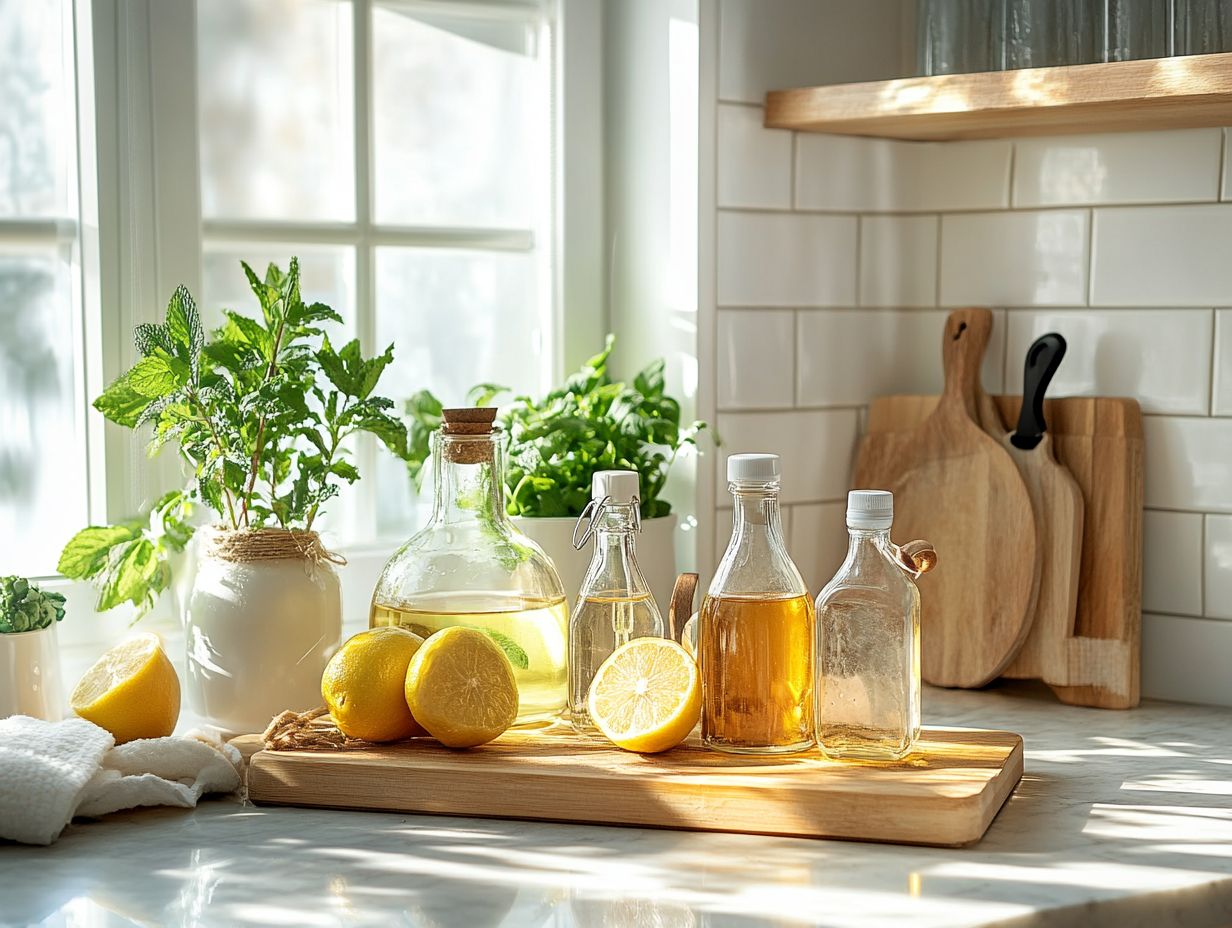
Some eco-friendly cleaning brands to consider are Attitude, Bon Ami, CLR, and Seventh Generation.
What Are the Benefits of Using Homemade Cleaners?
Homemade cleaners often utilize biodegradable packaging, which means the packaging can break down naturally and is less harmful to the environment.
1. Cost-effective: Homemade cleaners are made with simple, inexpensive ingredients. This can save you money in the long run compared to store-bought cleaners!
2. Environmentally friendly: They use natural ingredients, reducing your exposure to harsh chemicals and minimizing your impact on the environment.
3. Customizable: You have control over the ingredients, allowing you to tailor them to your specific needs and preferences.
4. Safe for your family and pets: Made with natural ingredients, these cleaners are safer for use around children and pets!
5. Versatile: Many homemade cleaners can be used for multiple purposes, reducing the number of products needed in your cleaning arsenal.
What Ingredients Are Commonly Used in Homemade Cleaners?
Simple ingredients like vinegar, baking soda, and essential oils are commonly utilized in DIY cleaning solutions!
Some common ingredients include vinegar, baking soda, lemon juice, essential oils, and castile soap. These ingredients are often found in household pantries and are known for their cleaning properties. Using these eco-friendly chemicals ensures that your cleaning products are allergen-free and safer for the environment.
Are Homemade Cleaners as Effective as Store-Bought Cleaners?
Many individuals find homemade cleaners to be as efficient as those found in stores, particularly when tailored to specific cleaning needs. Solutions from eco-friendly brands like Seventh Generation offer comparable results with a significantly reduced environmental impact.
Are Homemade Cleaners Difficult to Make?
The American Association of Poison Control Centers provides resources and guidelines to ensure safe preparation and storage of homemade cleaners.
No, most homemade cleaners are very simple to make! With just a few common ingredients and basic instructions, anyone can make their own cleaning products at home.
Start making your own cleaners today for a healthier home! Try these homemade cleaners now and see the difference for yourself!
Can homemade cleaners be used on all surfaces?
Commercial cleaners often contain formaldehyde and chlorine. These ingredients can damage some surfaces and harm ecosystems.
It depends on the specific ingredients used in the DIY cleaner. Ingredients like vinegar and lemon juice may not be suitable for sensitive surfaces such as marble or granite.
Before using DIY cleaners, do your research or test a small area first. For guidance, check resources from the Environmental Protection Agency (EPA), which helps protect human health and the environment, or the Environmental Working Group, known for its consumer advocacy and safety information.
How long do homemade cleaners last?
When stored properly, DIY cleaners can stay effective for several months. However, ingredients like essential oils can degrade faster, so check for any changes in scent or consistency.
It’s a good idea to label your cleaners with dates to keep track of their usability. To ensure freshness, consider making smaller batches to use within a few weeks.

